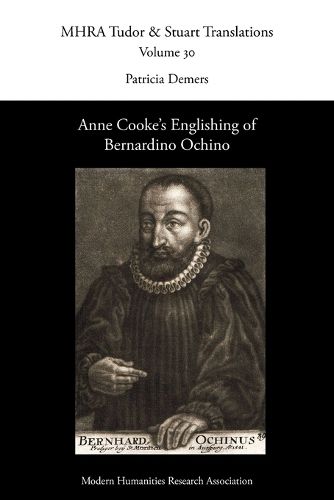Readings Newsletter
Become a Readings Member to make your shopping experience even easier.
Sign in or sign up for free!
You’re not far away from qualifying for FREE standard shipping within Australia
You’ve qualified for FREE standard shipping within Australia
The cart is loading…






This title is printed to order. This book may have been self-published. If so, we cannot guarantee the quality of the content. In the main most books will have gone through the editing process however some may not. We therefore suggest that you be aware of this before ordering this book. If in doubt check either the author or publisher’s details as we are unable to accept any returns unless they are faulty. Please contact us if you have any questions.
Sixteen years in advance of her widely approved translation of Jewel's Latin Apologia, Anne Cooke introduced a selection of sermons (Prediche) of the former Vicar General of the Capuchins, Bernardino Ochino, to an English readership. The 'Italian Luther', who had refused a summons to appear before Pope Paul III, and fled Italy to Geneva and then Augsburg, had landed in England at the invitation of Archbishop Cranmer in December 1547. Less than a year after his arrival, Sermons of Barnardine Ochine of Sena was printed without the name of the translator, and three years thereafter, Fouretene Sermons of Barnadine Ochyne, concernyng the predestinacion and eleccion of God. Translated out of Italian in to oure natyve tounge by A. C. appeared. Proving her aptitude for translation and eagerness to spread the word of the popular and prolific Italian evangelist, her work on the nineteen sermons forcefully articulates Evangelical and Spirituali tenets: the nature and excellence of antecedent election, lively and deep-seated faith that precedes works, rich citations of biblical texts to buttress claims, a heterodox endorsement of inner spirituality and practical activity, and freedom from obedience to Rome. Two distinct yet curiously similar temperaments blend in these translations. With limited contacts in English, the tormented sixty-year-old truth seeker had thrown off the Capuchin hood and devoted himself to writing. The capable, serious young noblewoman, who fervently espoused the Reform cause, experienced the need to prove and announce herself in a consciously homiletic mode.
$9.00 standard shipping within Australia
FREE standard shipping within Australia for orders over $100.00
Express & International shipping calculated at checkout
This title is printed to order. This book may have been self-published. If so, we cannot guarantee the quality of the content. In the main most books will have gone through the editing process however some may not. We therefore suggest that you be aware of this before ordering this book. If in doubt check either the author or publisher’s details as we are unable to accept any returns unless they are faulty. Please contact us if you have any questions.
Sixteen years in advance of her widely approved translation of Jewel's Latin Apologia, Anne Cooke introduced a selection of sermons (Prediche) of the former Vicar General of the Capuchins, Bernardino Ochino, to an English readership. The 'Italian Luther', who had refused a summons to appear before Pope Paul III, and fled Italy to Geneva and then Augsburg, had landed in England at the invitation of Archbishop Cranmer in December 1547. Less than a year after his arrival, Sermons of Barnardine Ochine of Sena was printed without the name of the translator, and three years thereafter, Fouretene Sermons of Barnadine Ochyne, concernyng the predestinacion and eleccion of God. Translated out of Italian in to oure natyve tounge by A. C. appeared. Proving her aptitude for translation and eagerness to spread the word of the popular and prolific Italian evangelist, her work on the nineteen sermons forcefully articulates Evangelical and Spirituali tenets: the nature and excellence of antecedent election, lively and deep-seated faith that precedes works, rich citations of biblical texts to buttress claims, a heterodox endorsement of inner spirituality and practical activity, and freedom from obedience to Rome. Two distinct yet curiously similar temperaments blend in these translations. With limited contacts in English, the tormented sixty-year-old truth seeker had thrown off the Capuchin hood and devoted himself to writing. The capable, serious young noblewoman, who fervently espoused the Reform cause, experienced the need to prove and announce herself in a consciously homiletic mode.